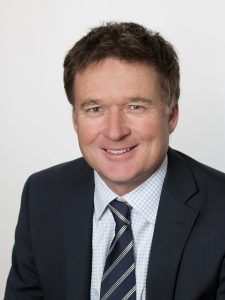 AUSTRALIAN Wool Innovation’s 2019 director election campaign has descended into rumour-mongering, with suggestions candidates running against AWI’s preferred ‘ticket’ wanted to ban mulesing.
AUSTRALIAN Wool Innovation’s 2019 director election campaign has descended into rumour-mongering, with suggestions candidates running against AWI’s preferred ‘ticket’ wanted to ban mulesing.
Peak grower body WoolProducers Australia today said it had fielded phone calls from growers asking if its recommended candidates — Phil Holmes, Janelle Hocking Edwards and Noel Henderson — would ban mulesing if elected.
WoolProducers said some growers contacted in Western Australia and Victoria had been told that this would be the case. In at least one case, a grower was called by a Merino stud breeder.

WPA president Ed Storey
WPA president Ed Storey said the people who called the growers were advocating against the WPA-preferred candidates, but he could not say whether they were supporting a specific ticket of candidates.
“This is a ridiculous notion for a number of reasons, firstly these candidates have stated that they support the continuance of mulesing and bring fresh thinking to the AWI board,” he said.
“Secondly, the AWI board does not have the capability or authority to ban anything,” Mr Storey said.
“But we are very concerned about how many of these calls have been made and if they are spreading untruths that is very disappointing.
“It sounds very much like campaigning for particular candidates and against others – campaigning is a legitimate practice, but deliberately using lies is very disappointing and it should not be part of the wool industry landscape.”
AWI election candidate Noel Henderson said he ceased mulesing in his Merino flock in 2011, but he did not believe that the practice should be banned. However, Mr Henderson said there is increasing social pressure in regard to mulesing and there are also market forces in play.
“There is quite clearly a premium being paid for unmulesed wool, in particular from Italy and we are yet to see how the Chinese are going to react to this, but the Italians are very strong on this and that they want to see it phased out.
“They only want to buy unmulesed wool and I think in a couple of years that’s what they’ll do,” he said.
“In Australia, I think we need to continue with the research to find a genetic solution to mulesing and in the meantime we’ve got to use the best practices available.”
“Certainly if mulesing is continued, it must be with pain relief.”
South Australian election candidate Janelle Hocking-Edwards said AWI cannot ban or mandate anything.
“It is a research, development and marketing organisation with no capability of banning or mandating or doing anything like that.
“AWI can produce options and solutions for growers to choose how they want to do their farming,” she said.
“We mules our Merinos with pain relief, so if mulesing was banned that would have a negative impact on our business in the short-term.”
“I also support moving toward acceptable measures to control flystrike.”
She believed the wool market would determine how long Australian growers could continue to mules.
NSW consultant Phil Holmes told The Land last month that there will always be a need to mules some sheep in some regions.
“We have the means now to construct excellent pain relief protocols that will satisfy all the animal welfare requirements.”
Merriman ticket made mulesing an election issue
AWI’s preferred candidates for the three directorships vacant in the 2019 election – re-standing directors Wal Merriman and David Webster and Dr Michelle Humphries — recently told shareholders in a letter that they have “a strong belief in the importance of maintaining the practice of mulesing for best practice animal welfare and industry viability”. They said they would defend growers’ ability to care for their sheep with “the best current practices”, but without specifically supporting mandatory pain relief or renewed breeder efforts to breed plain-bodied sheep to avoid mulesing by using existing AWI-funded tools such as breech wrinkle and visual sheep scoring.
WoolProducers has questioned the mulesing stance of the two incumbent directors – Mr Merriman and Mr Webster — given that there are now price premiums for non-mulesed wool and they have been on the board that has overseen AWI’s approach to mulesing for more than a decade. Australia has also lost demand from brands and retailers seeking non-mulesed wool, which have turned to other countries such as South Africa, South America and New Zealand.
WoolProducers today said it has tried hard to work with AWI on this issue to retain growers’ social and legal right to mules over the last number of years, but was repeatedly told by AWI that “mulesing is not an issue and that we were the only ones talking about mulesing”.
WPA said the fact that mulesing is now no longer acceptable to many of Australia’s wool customers is solely the fault of AWI.
“It was simply not a viable business model that AWI employed which was to ignore your customers whilst continually not telling Australian growers the realities of the world market, despite WoolProducers trying to work constrictively with them for many years on this very issue.”
‘WoolProducers strongly believes that change is required and that it is up to growers to vote for change if we are to have a viable industry,” Mr Storey said.
He said WPA’s recommended candidates have all stated that they will bring a new line of thinking to this and other critically important issues.
The two incumbent director candidates Mr Merriman and Mr Webster, have had over a decade to address this issue and are now talking about ‘novel’ ideas to defend growers’ rights around the need for mulesing.
“How much longer do they need given both Mr Merriman and Mr Webster have sat on the board for over a decade which has seen the eventuation of premiums for non-mulesed wool and the loss of markets for mulesed wool,” Mr Storey said.

HAVE YOUR SAY